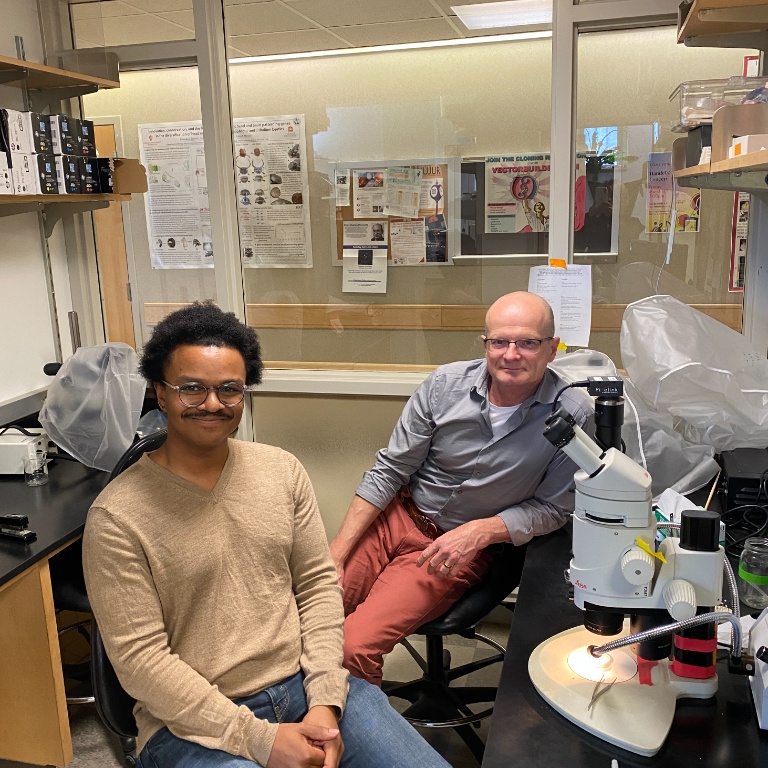Indiana University Bloomington’s Department of Biology is leading research on the mechanisms and consequences of organisms’ responses to environmental conditions. This research, recently published as an open-access review in the Journal of Experimental Biology, delves into these complex interactions through the lens of dung beetle biology. The collaborative effort involves IU biology professor and department chair-elect Armin Moczek, Ph.D. candidate Josh Jones, and Patrick Rohner, assistant professor of biology at UC San Diego and former IU biology postdoctoral researcher in the Moczek Lab.
“This publication was an invited review paper following a conference one of us attended, and it comes with a bit more freedom to write about the things you care about and explore them to a depth that you normally are not permitted to do in many primary research publications,” Moczek said.
Moczek explained that organisms, whether insects, plants, or humans, respond to environmental conditions in their function, growth, and development. “A fundamental area of research in biology is to understand the interactions between organisms and their environment as they grow, differentiate, and turn themselves from egg to adult,” he said. This research has significant implications for both health and ecological perspectives.
“If those interactions go wrong, they can lead to disease. From an ecological perspective, these same interactions determine whether organisms can withstand stressors such as heat waves or pollution. As such this research is embedded within a larger field and community of researchers to which we hope to contribute through this publication.
One of the study’s unique aspects is the use of dung beetles as a model system. “We can manipulate many of the variables relevant to this kind of work, from temperature to the availability of symbiotic microorganisms, in an experimentally controlled manner. We are lucky in that we have access to such a versatile system that allows us to explore real-world, meaningful organism-environment interactions in a rigorous experimental framework,” Moczek said.
Josh Jones, whose work focuses on the dietary habits of organisms and their microbial interactions, contributed significantly to the review. “The paper we published is kind of a combination of different ideas. My work specifically goes in the direction of how organisms – mainly insects – are able to eat so many different diets,” Jones said. “They’ll eat the plants in the garden; books on the shelf; anything in your pantry.”
Jones noted that having a group of organisms capable of eating a wide variety of otherwise challenging diets – such as dung beetles eating dung – requires significant effort, often enabled by microbes. “As we look at the biodiversity on Earth, we are now in a position to explore not just how animals and plants exist in their respective environments, but also how microbes help them do so in the face of challenging conditions and stressors.”
The review also highlights that organisms often pass on more to their offspring than just genes. “The food that our beetle larvae eat is partitioned for them by their mothers in the form of an underground brood ball,” Moczek explained. “Mom creates this underground nursery, all the food that her offspring needs, and then also provides them with the microbial partners that her offspring will need to digest that food.”
Jones elaborated on the broader implications of their research, particularly regarding diet and development. “We’re focused on diet because in many organisms microbes help you digest what you eat. But there’s also growing research as to how microbes and what they do for hosts helps in host development. In humans, microbes are very important for immunity because if the child is not provided with specific microbes that mom provides through breast milk, then the infant’s ability to deal with infections is very out of whack. Yet the necessary experimental work to get at these interactions is usually not feasible in humans, but fairly straightforward in dung beetles”.
Both Moczek and Jones emphasized the importance of collaborative research. “Science is greatly benefited when diverse perspectives are brought together,” Jones said. Moczek added, “For me, collaborating with a graduate student is perhaps one of the most enjoyable aspects of scientific research and writing. Especially when it involves people whose expertise is only partly overlapping with my own, because it allows me to learn new things, and I hopefully can teach something new to others in return.”
Moczek praised Jones for pioneering this study system to its current level. “He is the first to develop this study system to address these kinds of questions at the interface of hosts, microbes, and the environment.”

 The College of Arts
The College of Arts